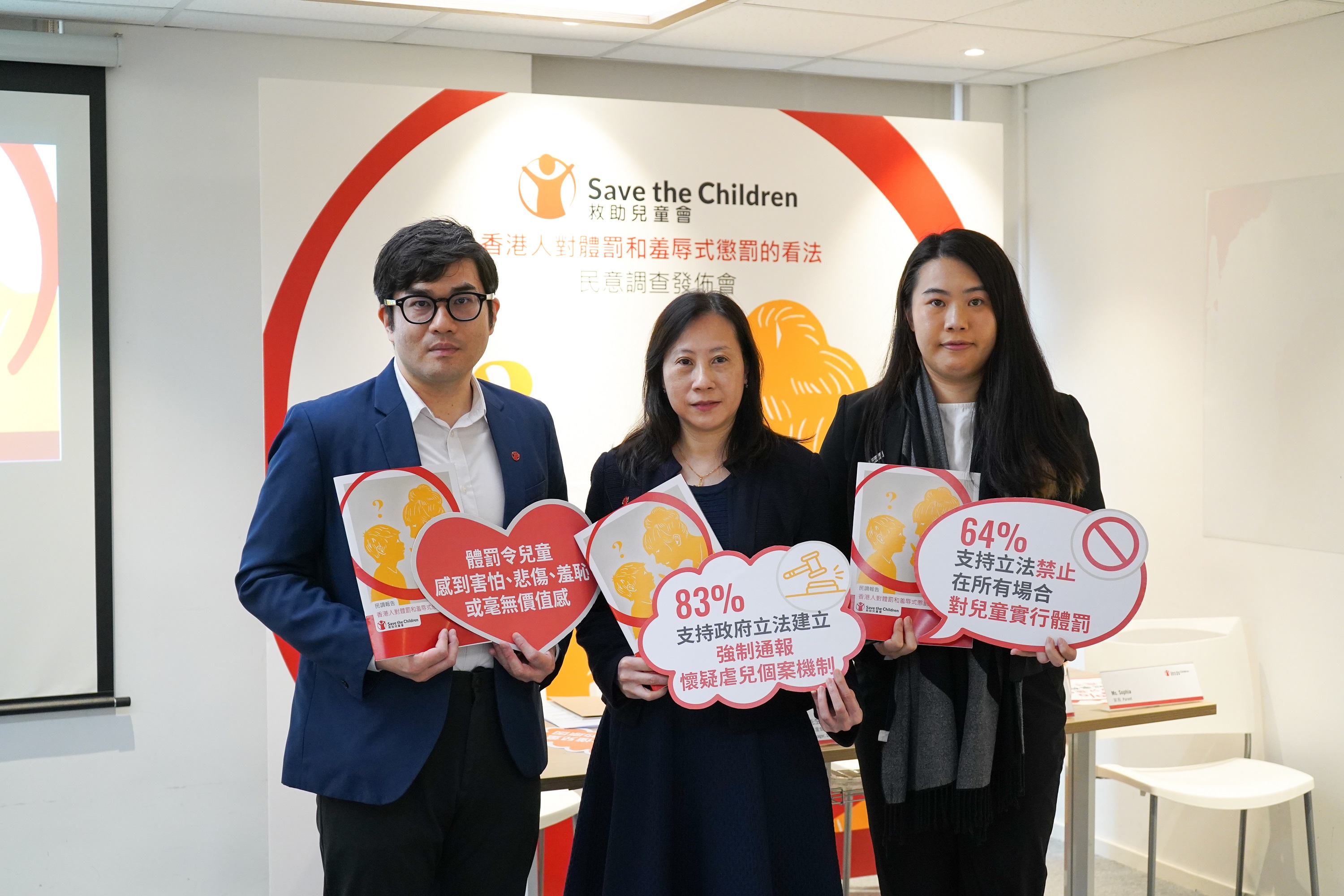Save the Children Hong Kong Releases Survey Findings on "Public Views on Corporal Punishment on Children"
Over 80% support legislating Mandatory Reporting Requirement
HONG KONG SAR - Media OutReach - 27 April 2023 - It is the responsibility of the society to protect children from harm and violence, regardless of the setting.
This includes taking action to prevent abuse and mistreatment in the home, as well as outside of the home and in institutional settings. Save the Children Hong Kong commissioned Centre for Communication and Public Opinion Survey, the Chinese University of Hong Kong to conduct public opinion polling on physical and humiliating punishment and Mandatory Reporting Requirement for suspected child abuse cases, gathering responses from 1,008 adults in Hong Kong. 
Majority Reluctant to Intervene in Corporal Punishment on Children
In the polling, only 23% of respondents acted upon witnessing other adults beating, slapping or verbally humiliating their children on the street. There are several reasons why individuals may choose not to act, including a reluctance to intervene in other families' personal matters (54.5%), a belief that the incident is not severe enough to warrant intervention (30.7%), and uncertainty about whether the situation constitutes child abuse (30.4%). This potentially delays the identification of child abuse cases, which could lead to serious violence and harm to child victims.
Misconception of Corporal Punishment as a Private Family Matter
One-third of respondents (31.1%) agreed that disciplining children is an internal matter of the family, and outsiders should not interfere. Among those who did not intervene when witnessing parents or caregivers exercising corporal punishment, more than half of them (54.5%) saw it as a private family matter. Save the Children Hong Kong believes this reflects a traditional and cultural norm contributing to corporal punishment.
Ms. Winnie Ng, Spokesperson of Save the Children Hong Kong, expresses that, "Corporal punishment is not a private family matter, as it violates children's rights and can have long-lasting negative effects on their well-being. It is the society's responsibility to ensure that all children are protected from harm. Positive parenting needs to be reinforced through public education to fulfil this responsibility. We also encourage bystanders to step up and protect children from violence they witness." She emphasises the need to strengthen support for positive parenting and prioritise the best interests of the child.
Ms. Sylvia Chung, Chairperson of Division of Counselling Psychology of Hong Kong Psychology Society, also concerns about the report's finding, " Corporal punishment causes a collective trauma that can have a devastating impact on children and parents. Corporal punishment can cause trauma to children physically and psychologically, which distorts the nature of children's need to be nurtured and loved. Preventing children from addressing their unmet emotional needs may cause them to question the potential for building relationships in a non-violent manner. This, in turn, can have negative effects on their interactions with others and their self-image, and even impact the way they treat their own children in the future."
Polling Shows Strong Public Support for Legislating Mandatory Reporting Requirement
83.2% of respondents support the government legislating a mandatory reporting mechanism to ensure professionals who have regular contact with children report suspected child abuse and neglect cases. This level of public support creates a favourable environment for the government to move forward with the legislative process. Legislators should consider stakeholders' opinions, including children's suggestions, and initiate the legislative process as soon as possible.
Ms. Winnie Ng, highlights that the poll findings support an urgency to legislate Mandatory Reporting. The mandatory reporting requirement is a significant step to strengthen child protection. Save the Children Hong Kong also recommends the government to mandate Child Safeguarding policies for organisations that frequently interact with children. This would support mandated reporters and streamline cooperation with local authorities during investigations.
Building the Path Towards a Ban on Corporal Punishment of Children in All Settings
The study also shows 64.2% of respondents support legislation to prohibit any form of corporal punishment towards children in all settings, including at home. However, the current legislation in Hong Kong only prohibits corporal punishment in certain public settings, such as schools and organisations.
Across the world, 65 countries have already legally prohibited physical punishment of children in all settings, including Sweden, Germany, Spain, Japan, and South Korea. To create a culture that prioritises the best interests of the child, the government, child-facing institutions, and parents must continue the conversation on developing a supportive environment, and build a path towards a ban on corporal punishment of children in all settings.
For detailed survey results, please click here.
Hashtag: #SavetheChildrenHongKong
https://www.linkedin.com/company/save-the-children-hong-kong/
https://www.facebook.com/savethechildrenhk
https://www.instagram.com/savethechildrenhk/
https://www.youtube.com/user/savehk
The issuer is solely responsible for the content of this announcement.
Save the Children Hong Kong
Save the Children believes every child deserves a future. In Hong Kong and around the world, we do whatever it takes – every day and in times of crisis – so children can fulfil their rights to a healthy start in life, the opportunity to learn and protection from harm. Established in 2009, Save the Children Hong Kong is part of the Save the Children global movement which is made up of 30 member organisations and operates in almost 120 countries. With over 100 years of expertise, we are the world's first independent children's organisation – transforming lives and the future we share. Visit our website, or follow us on Facebook , Instagram, LinkedIn and YouTube.

















